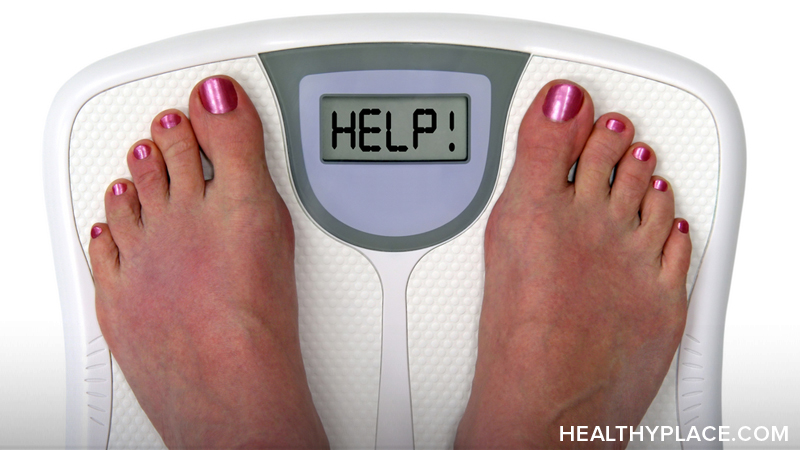What Are Eating Disorders? Eating Disorder Information

Almost everyone worries about their weight, at least occasionally. People with different types of eating disorders take such concerns to extremes, developing abnormal eating habits that threaten their wellbeing and even their lives. This eating disorder information answers the question "What are eating disorders?" and explains the types of eating disorders, who are at risk, the causes as well as treatment issues.
What Are the Different Kinds of Eating Disorders?
While there are over ten different eating disorders, the following eating disorder information focuses on the three most common ones:
- Anorexia Nervosa: Those with anorexia nervosa (often just referred to as anorexia) have a distorted body image causing them to see themselves as overweight even when they're dangerously thin. They refuse to eat, exercise compulsively, and develop unusual eating habits such as refusing to eat in front of others; they lose large amounts of weight and may even starve to death.
- Bulimia Nervosa: Those with bulimia nervosa (often referred to as just bulimia) eat excessive quantities of food, and then purge their bodies of the food and calories by using laxatives, enemas, diuretics, vomiting and/or exercising. Often acting in secret, they feel disgusted and ashamed as they binge, yet relieved of tension and negative emotions once they have purged.
- Binge Eating Disorder: People with binge eating disorder experience frequent episodes of out-of-control eating, similar to bulimia; however, eating disorder information indicates binge eaters don't purge their bodies of excess calories.
Research emphasizes the importance of preventing problematic eating behaviors from evolving into full-fledged eating disorders. Anorexia and bulimia, for example, usually are preceded by very strict dieting and weight loss. Binge eating disorder can begin with occasional bingeing. Whenever eating behaviors start having a destructive impact on someone's functioning or self-image, it's time to become educated, research in-depth information about eating disorders, and see a trained mental health professional, such as a licensed psychologist experienced in treatment for eating disorders.
Who Suffers From Eating Disorders?
According to eating disorders information provided by the National Institute of Mental Health, adolescent and young women account for 90 percent of cases. But eating disorders aren't just a problem for teenage girls, as is so often depicted in the media. Older women, men, and boys can also develop disorders (Eating Disorder Facts: Who Gets Eating Disorders?). An increasing number of ethnic minorities are also falling prey to these devastating illnesses.
People sometimes have eating disorders without their families or friends ever suspecting they have a problem. Aware their behavior is abnormal, but perhaps not understanding why, people with anorexia, bulimia or binge eating may withdraw from social contact, hide their behavior and deny their eating patterns are problematic. Making an accurate diagnosis requires the involvement of a licensed psychologist or other appropriate health professional.
What Causes Eating Disorders?
Certain psychological factors predispose people to develop eating disorders. Dysfunctional families or relationships are one factor. Personality traits are commonly noted in research and other literature as also contributing. Most people with eating disorders suffer from low self-esteem, perfectionism, feelings of helplessness and intense dissatisfaction with the way they look. Physical factors, such as genetics, also may play a role in putting people at risk. (read: Many Causes of Eating Disorders)
A wide range of situations can precipitate eating disorders in susceptible individuals. Some examples are:
- Family members or friends may repeatedly tease people about their bodies, not aware this can be harmful.
- Individuals may be participating in gymnastics or other sports that emphasize low weight or a certain body image.
- Negative emotions or traumas such as rape, abuse, or the death of a loved one can also trigger eating disorders.
- Even a happy event, such as giving birth, can lead to eating disorders because of the stressful impact of the event on an individual's new role and body image.
Unfortunately, once people start engaging in abnormal eating behaviors, the problem can perpetuate itself.
Why is it Important to Seek Treatment for Eating Disorders?
Eating disorder information and research indicates eating disorders are one of the psychological problems least likely to be treated. But eating disorders don't often go away on their own and leaving them untreated can have serious consequences. In fact, the National Institute of Mental Health estimates one in ten anorexia cases ends in death from starvation, suicide or medical complications like heart attacks or kidney failure.
Eating disorders can devastate the body. People are often unaware of the physical health problems and complications associated with eating disorders. They include:
- Anemia
- Heart palpitations
- Hair and bone loss
- Tooth decay
- Inflammation of the esophagus (esophagitis)
- Cessation of menstruation
- High blood pressure
- Diabetes
- Other problems associated with obesity or starvation
Eating disorders are also associated with other mental illnesses. Researchers are unsure whether the eating disorder causes the mental illness or vice versa. What is clear, however, is that people with eating disorders suffer higher rates of other mental illness - including depression, anxiety disorders and substance abuse - than other people.
Find out where to get help for eating disorders.
Medical Professionals Aid in Eating Disorder Recovery
Through eating disorders therapy, psychologists play a vital role in the successful treatment of anorexia, bulimia and binge eating. They are integral members of the multidisciplinary team required to provide patient care and can be one of the sources of eating disorder information.
Other members of this team include:
- Physician: to provide medical information, to rule out medical illnesses, determine any harm done to the person with the eating disorder, and provide medical attention, if necessary; prescribe medication, if necessary
- Nutritionist: to help assess, provide information on healthy eating, and improve nutritional intake
Once the physician has ruled out medical complications, and possibly a nutritionist has been consulted, a psychologist identifies important issues needing attention. He will use the information gathered from the patient and others, including family members, to develop a treatment plan. This treatment plan could include:
- Teaching eating disorder information about the causes and effects of the disorder
- Using therapy to help the patient understand what lead to the eating disorder and replace destructive thoughts and behaviors with more positive ones
- Working with the patient to focus on health rather than weight
- Requesting the patient keep a food diary as a way of becoming more aware of the types of situations that trigger eating patterns
Changing a patient's thoughts and behaviors, and providing information is not enough, however. To ensure lasting improvement, psychologists and patients must work together to explore the psychological issues underlying the eating disorder.
To accomplish that, the following may be added to aid in the changing of thoughts and behaviors:
- Psychotherapy focusing on improving a patient's personal relationships
- Psychotherapy to help patients get beyond the situation that initially triggered the eating disordered behavior
- Group therapy to provide support and informal eating disorder information
- Family or marital therapy to improve relationships, and teach others about the condition and how to cope with it at home
- Medication, particularly in bulimia
In-depth information on eating disorder recovery here.
Does Treatment Really Work?
Yes. Most eating disorders can be treated successfully by appropriately trained health and mental health care professionals. However, for many patients, treatment may need to be long-term and must initially include learning information about eating disorders.
Remember: The sooner treatment starts, the better. The longer abnormal eating patterns continue, the more deeply ingrained they become and the more difficult they are to treat.
Eating disorders can severely impair people's functioning and health. However, research indicates the prospects for long-term recovery are good for most people who seek help from appropriate professionals. Qualified therapists, such as licensed psychologists with experience in this area, can help those who suffer from eating disorders regain control of their eating behaviors and their lives.
Hopefully, we've answered the question: "What are eating disorders?" More specific information follows.
More Eating Disorders Articles
- Types of Eating Disorders: List of Eating Disorders
- Eating Disorder Symptoms
- Warning Signs of an Eating Disorder
- Eating Problems: Signs You May Have an Eating Problem
- Eating Attitudes Test: Do I Have an Eating Disorder?
- Eating Disorder Health Problems and Complications
- Types of Treatment for Eating Disorders
- Eating Disorder Treatment Center and Facilities
- Medications for Eating Disorders
- Eating Disorders Therapy: Psychotherapy and Group Therapy
- Eating Disorder Support Groups
APA Reference
Tracy, N.
(2022, January 4). What Are Eating Disorders? Eating Disorder Information, HealthyPlace. Retrieved
on 2026, January 26 from https://www.healthyplace.com/eating-disorders/eating-disorders-overview/what-are-eating-disorders-eating-disorder-information


